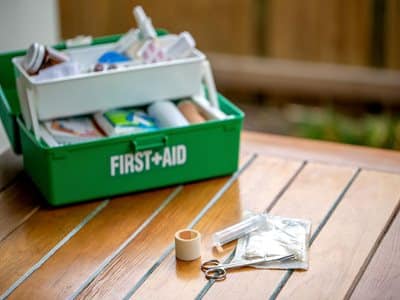It is a very positive sign that many in the country have turned to gardening during these difficult times. The benefits of which far outweigh any negatives. In line with all the ‘stay safe’ messaging we felt a reminder on how to avoid injury would be a good idea.
It’s also important given that a staggering 87,000 people* are injured each year while actively gardening or carrying out DIY jobs in the garden!
The Royal Society for the Prevention of Accidents (RoSPA) has assessed the most dangerous tools, here are their top three:

Even seemingly harmless hoses and sprinklers made it into the top 10 with 1,900 yearly accidents. So, from the content of the soil in your borders to the tools you use and even the weather, we’ve put together an overview of what to watch out for.
Because many of us garden for pleasure, often on a nice sunny day, we’re relaxed and it can be easy to overlook a simple measure such as dressing suitably. Wear long sleeves, trousers and hats to prevent sun burn, cuts and stings, for example, but avoid loose clothing and tie back long hair when using machinery. Apply sun screen to exposed skin.
Personal Protective Equipment (PPE) will also be necessary in some instances. Putting on gloves could prevent many of the cuts that occur, wearing strong shoes and trousers when mowing the lawn rather than shorts and sandals is also sensible, as are eye and ear protection when using power tools.
A residual current device (RCD) is a must when using electric tools. RCDs instantly cut off the power if an accident occurs so should always be used with items such as electric lawn mowers, hedge trimmers and strimmers.
Keep machinery well maintained, servicing when appropriate but switch off the power before carrying out any maintenance.
Limit distractions, such as children and pets, when using machinery and power tools and, above all, follow instructions.
Servicing manual equipment can be overlooked as a safety need. A blunt blade can be as dangerous as a sharp one. By sharpening blades and checking all fixings are secure, you’ll not only protect yourself from harm, but you’ll also make the work easier for yourself. Remember to use gloves when sharpening or cleaning blades to prevent cuts. If in doubt take equipment to a specialist for servicing.
Always follow the manufacturer’s advice that comes with the product. It should go without saying that chemicals must be stored out of sight and out of reach of children and pets, preferably under lock and key, but it’s worth a reminder. It’s also worth noting that chemicals should be stored out of direct sunlight to prevent the packaging from deteriorating and subsequent leakage.
Soil contains many millions of bacteria and other micro-organisms, some of which are essential to sustain healthy plant growth. Most are harmless but some are potentially dangerous. You can minimise risk by purchasing topsoil that’s been tested to the latest British safety requirement (BS 3882:2015). Wear gloves when handling soil and always wash your hands when you have finished, even having worn gloves.
Aside from learning which plants aren’t edible, finding out which may be skin irritants or contain allergens could help prevent a reaction. Again, if in doubt ensure your skin is well covered when handling plants. The RHS gives advice on potentially harmful plants to watch out for and how to get help if needed.
A basic one, but important nonetheless. Before starting a job, clear the area of slip and trip hazards and be attentive of wires, overhanging branches and other potential dangers. Check for uneven, slippery or loose surfaces. Even walking around an area that you know well, it’s possible to trip over flowerpots or garden ornaments, especially if you’re carrying something which restricts your vision. Then, when you’ve finished, tools should be tidied away.
We all know our own capabilities and it’s important to work within them. Be aware of the risks from heat and the sun, work in the shade, wear hats and sun block and keep well hydrated. Simple things like asking for help with lifting or footing a ladder sometimes seem like more bother than the job itself but can save you a trip to A&E! As can remembering not to overstretch when working at height.
Always remember: stay alert in your garden, ask for help when needed and wash hands well afterwards – that way you can ensure your garden remains a place of enjoyment.
*Source: Royal Society for the Prevention of Accidents (RoSPA) https://www.rospa.com/
Author: Hannah McGouran, Rolawn
As Rolawn’s resident Copy and Digital Content Creator Hannah draws on her degree in Linguistics and Social Sciences, many years of marketing experience and a love of gardening, to make the world of turf, topsoil, barks and mulches accessible to the masses.